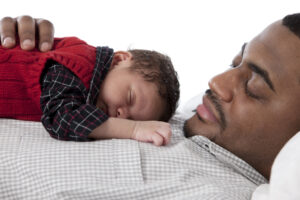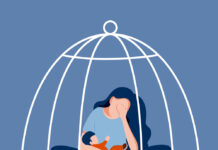From The Varsity:
“Research on postpartum mental health issues have traditionally been focused on women. But while new mothers’ mental health is an important issue to address, it does not take away from the importance of checking in with the fathers.
“Poor maternal mental health has been shown to negatively impact the baby’s development, and postpartum depression and anxiety in fathers can have the same effect. If both parents show symptoms of mental distress, the effect on the baby’s development is further worsened. Identifying and treating these postpartum conditions is vital to ensure that parents are able to properly take care of their child….
“A recent study, led by Cindy-Lee Dennis of the Lawrence S. Bloomberg Faculty of Nursing, looked into postpartum depression and anxiety in new fathers. Dennis is cross-appointed with the Psychiatry Department in the Temerty Faculty of Medicine, and is currently the women’s health research chair for the Li Ka Shing Institute at St. Michael’s Hospital. Her research focuses on improving the well-being of parents in order to improve the well-being of their children.
“The study highlighted the shocking prevalence of postpartum struggles in fathers. It examined the mental health of 2,500 fathers between three weeks and two years after the birth of their child. The results showed that postpartum mental health disorders were common in 22 percent of the participating fathers in the first year of the child’s life….”
















It’s not shocking at all. The research simply wasn’t paying attention because funding favors research that excludes men. There is socio-political pressure to act as though men are optional and fathers don’t matter. That bigotry has harmed countless millions of children, not to mention the overlooked men themselves.
Report comment
It is also “surprising” because doctors and other “wise ones” have blamed “hormones” for all cases of “postpartum depression,” in the interest of promoting their biological solutions to women’s “hormone problems.” This, of course, is an ancient trope used in service of oppressing women through asserting that their “hormone swings” make them incapable of thinking, voting, holding political office, owning land, etc. The idea that MEN might suffer from “postpartum depression” shoots a gigantic, cannonball sized hole in the side of the “it’s women’s hormones” ship, and so of course must never be considered. If MEN can become depressed after a birth, well gosh, that means it might have something to do with the CONDITIONS new parents have to tolerate rather than some random “hormone imbalances” caused by God’s poor design of women’s bodies.
Of course, the industry will now embark upon an effort to prove that MEN’S hormones are somehow altered after their partner gives birth, spending millions of dollars and assuring us that “the solution will be right around the corner” instead of observing the obvious and trying to work on improving post-birth support for both men AND women.
Report comment